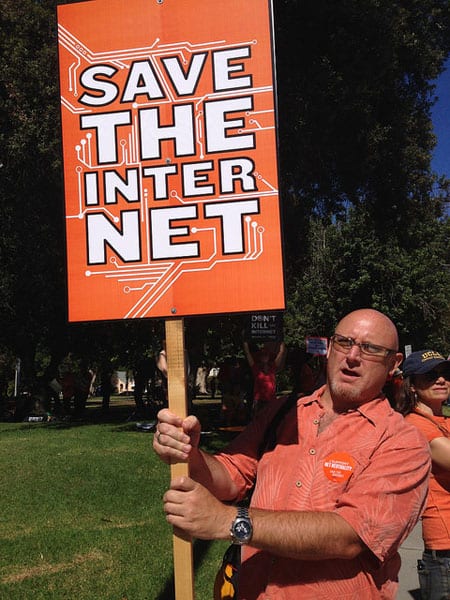
October 3, 2018; C-Net, The Verge, and Ars Technica
On September 30th, Governor Jerry Brown signed into law a sweeping piece of legislation that, at the start of 2019, would reestablish in California protections that the FCC’s net neutrality policies had in place before their repeal this summer. Hours later, the Department of Justice announced its intent to block the legislation from taking effect. Not long after that, lobbyists representing mobile telecommunications, cable providers, and broadband ISPs joined the queue, vowing to stop the state’s efforts.
The California law prohibits the same things that the 2015 rules put in place by former FCC Chair Tom Wheeler did: blocking of lawful content, throttling of speeds to particular sites, creating online “fast lanes,” or requiring payments from “edge providers”—the makers of content and internet-capable devices—to ensure their offerings aren’t degraded or blocked. It goes further, though, and also bars “zero rating,” the practice of selectively exempting specific sites or offerings in a category from a customer’s data usage. (For example, deciding that one streaming media service doesn’t count toward one’s monthly downstream allotment while another one does.)
“While the Trump administration does everything in its power to undermine our democracy, we in California will continue to do what’s right for our residents,” California State Senator Scott Wiener (D-San Francisco), author of the net neutrality bill, said on Sunday.
The Department of Justice’s case alleges that this is an effort by the state of California to circumvent the decision of the FCC. Since it’s not reasonable for ISPs and cable companies to have one set of protocols for the rest of the country and another for California, they say, this law would effectively reinstate net neutrality nationwide, and that’s not something a state government can do. As reported in Ars Technica,
“Because its regulatory approach directly conflicts with the FCC’s, SB-822 inflicts irreparable harm on both the United States as well as the public interest more generally,” the DOJ told the court. “As this Court recently noted, ‘[t]he United States suffers injury when its valid laws in a domain of federal authority are undermined by impermissible state regulations,’ and ‘[f]rustration of federal statutes and prerogatives are not in the public interest.’”
The lobbyists’ suit makes similar claims, saying the law impermissibly regulates interstate commerce and is therefore unconstitutional.
However, the decision to repeal net neutrality nationwide may have inadvertently removed the FCC’s power to interfere in this matter. The Verge, in conversation with a statement from Stanford Law professor Barbara van Schewick, writes:
Sign up for our free newsletters
Subscribe to NPQ's newsletters to have our top stories delivered directly to your inbox.
By signing up, you agree to our privacy policy and terms of use, and to receive messages from NPQ and our partners.
Foreseeing state challenges to their attack on federal oversight, lobbyists for both Comcast and Verizon last year successfully urged the FCC to include language in its net neutrality repeal “pre-empting” (read: banning) states from protecting consumers moving forward.
But telecom industry legal experts say that when the FCC dismantled its own authority over broadband ISPs (by rolling back their classification of ISPs as Title II common carriers under the Telecom Act), it ironically killed any authority it might have had to tell states what to do.
“An agency that has no power to regulate has no power to preempt the states, according to case law,” said in a statement to The Verge.
“When the FCC repealed the 2015 Open Internet Order, it said it had no power to regulate broadband internet access providers,” van Schewick said. “That means the FCC cannot prevent the states from adopting net neutrality protections because the FCC’s repeal order removed its authority to adopt such protections.”
Ernesto Falcon, legislative counsel at the nonprofit Electronic Frontier Foundation, told the Verge, “Congress created the Telecom Act created to be a joint federal-state jurisdiction law, which is why every state has its own public utilities commission, power over franchises, state pole attachment regulations, consumer protection power, and state-based ISP privacy rules.”
Falcon argues that the DOJ lawsuit is “specifically designed to stall state protections.” A statement from the EFF says:
To date, 30 state legislatures have introduced bills that would require their Internet Service Providers (ISPs) to maintain net neutrality as a matter of law. Four of those states (Washington, Oregon, Vermont, and now California) have passed laws with strong bipartisan majorities, and more are promising to follow suit in 2019. Six state governors (Montana, New York, New Jersey, Hawaii, Vermont, and Rhode Island), led by Gov. Steve Bullock of Montana, have issued Executive Orders declaring that the state’s government will not do business with ISPs that violate net neutrality.
And, while individual states are introducing bills, around two dozen attorneys general have brought suit against the FCC to have the decision reversed entirely. The fight to preserve access to a free and open internet continues, and we are, as ever, riveted.—Jason Schneiderman













